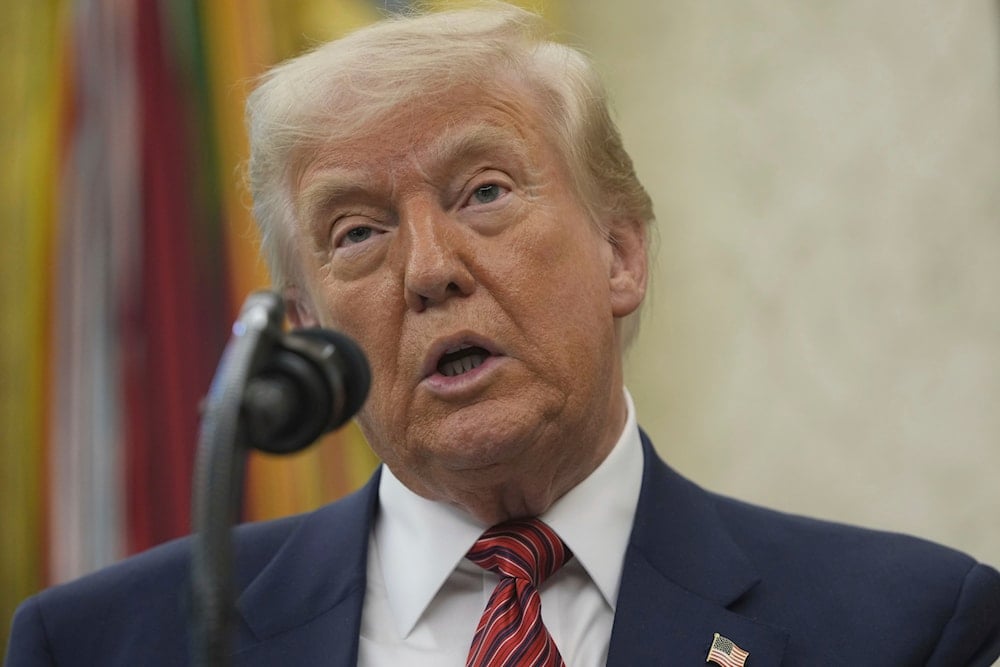Gaza ceasefire, chips, and naming rights: Trump signals Mideast moves
Trump says updates are imminent on a possible Gaza ceasefire and captive deal, while also hinting at easing chip export rules for Gulf states.
-

President Donald Trump speaks before David Perdue is sworn in as US Ambassador to China during a ceremony in the Oval Office of the White House, Wednesday, May 7, 2025, in Washington. (AP)
US President Donald Trump indicated on Wednesday that fresh developments may soon emerge concerning a potential ceasefire and captive deal in Gaza. Speaking from the White House, Trump said, "A lot of talk going on about Gaza right now. You'll be knowing probably in the next 24 hours."
While Egyptian security sources had previously told Reuters that ceasefire talks in Cairo were nearing a breakthrough, a senior official close to the mediation dismissed the idea of a finalized proposal. "There are intensified efforts by the mediators and contacts have never stopped, but there isn’t a concrete proposal yet," the official said.
The source noted that "Hamas still insists on its full package ceasefire deal in return for an end to the war, while Israel doesn’t want to end the war."
Trump hints at easing chip export curbs to Gulf nations
In a separate announcement, Trump suggested the US may soon loosen restrictions on semiconductor exports to certain Gulf nations. When asked directly, he said, "We might be doing that, yeah. And it will be announced soon."
The potential shift would mark a departure from strict export controls previously imposed over fears of advanced US AI chips reaching China via the Middle East.
Trump is expected to visit Saudi Arabia next week as part of his first major diplomatic trip in the region. He also addressed ongoing reports that the US might rename the "Persian Gulf" to the Arabian Gulf, saying he would “give a briefing” on the issue soon, a move likely to be welcomed by Arab Gulf states but could inflame tensions with Iran.
When pressed on reports that the US may be deporting migrants to Libya, Trump responded, "I don't know. You'll have to ask Homeland Security."
Araghchi warns: 'Wrath of all Iranians' if Trump renames 'Persian Gulf'
Earlier today, Iranian Foreign Minister Abbas Araghchi issued a sharp warning following reports that US President Donald Trump may attempt to rename the "Persian Gulf" during his upcoming visit to Saudi Arabia. Speaking on X, Araghchi cautioned that such a move would provoke the "wrath of all Iranians," describing the possible rebranding as a hostile provocation.
The name Persian Gulf, like many geographical designations, is deeply rooted in human history. Iran has never objected to the use of names such as the Sea of Oman, Indian Ocean, Arabian Sea, or Red Sea. The use of these names does not imply ownership by any particular nation, but… pic.twitter.com/PQjUiph4qt
— Seyed Abbas Araghchi (@araghchi) May 7, 2025
"Let's hope that the absurd rumors about the PERSIAN Gulf that are going around are no more than a disinformation campaign by 'forever warriors' to anger Iranians all over the world and agitate them," Araghchi wrote on Wednesday.
The statement came after an Associated Press report, citing unnamed US officials, suggested Trump intends to refer to the region as the “Arabian Gulf” or “Gulf of Arabia,” breaking with internationally accepted nomenclature.
In January of this year, the Trump administration's Interior Department claimed to have "officially" changed the name of the Gulf of Mexico to the "Gulf of America," as well as the Alaskan peak Denali to Mount McKinley.
"I am confident that Donald Trump is aware that the name PERSIAN Gulf is centuries old and recognized by all cartographers and international bodies and was even used by all leaders of the region in their official communications until as recently as 1960s," Araghchi said.
He warned that any unilateral attempt to rename the waterway would not alter its legal or geographical status but would provoke widespread outrage. “It will only bring the wrath of all Iranians from all walks of life and political persuasion in Iran, the US, and across the world," he said.
Read next: US prioritizes shipping, not 'Israel', in ceasefire deal with Yemen

 4 Min Read
4 Min Read










